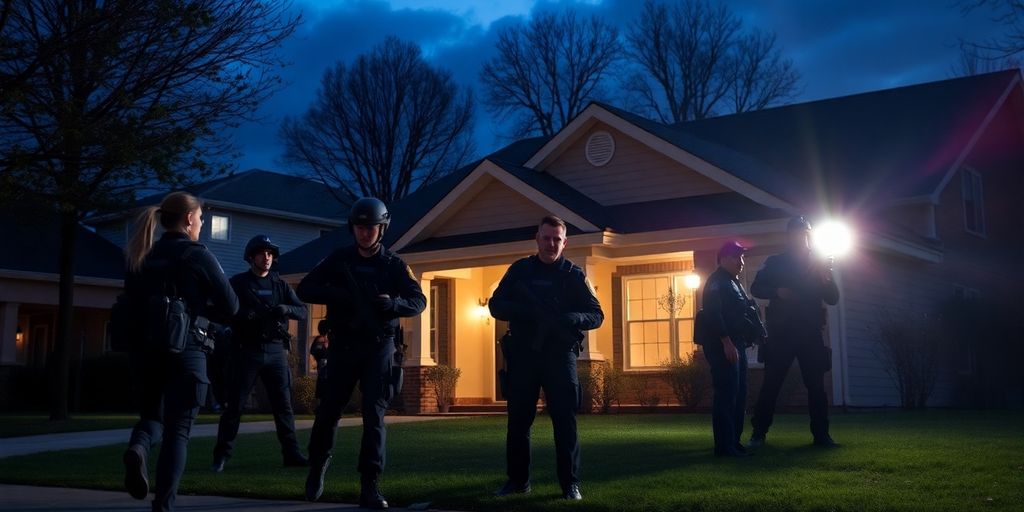Civil Rights
Justice on Trial: Trump Administration’s Wrong-House Raid Sparks Accountability Debate

In a pivotal case, the Trump administration faces scrutiny over a botched raid that targeted the wrong house, raising questions about government accountability and the rights of citizens. The Supreme Court’s deliberations could set a significant precedent regarding the consequences of law enforcement errors.
Key Takeaways
- The Supreme Court is reviewing a case involving a wrong-house raid by federal agents.
- Government lawyers argue that mistakes are part of law enforcement, while justices express skepticism.
- The case highlights the trauma experienced by innocent families during such raids.
- A decision could impact future accountability for law enforcement errors.
Background of the Case
The case, known as Martin v. USA, centers around a raid conducted by federal agents who mistakenly entered the home of an innocent family. During the raid, agents used a smoke grenade, causing significant distress to the family, including their seven-year-old son. The family is seeking accountability for the trauma and damages incurred due to the government’s error.
Government’s Defense
During the Supreme Court hearings, government lawyers defended their actions by claiming that errors are an inherent risk in law enforcement operations. They argued that checking the house number could expose agents to potential danger, suggesting that the urgency of executing multiple warrants simultaneously justified their actions.
- Key Arguments from Government Lawyers:
- Mistakes are part of the job.
- Delaying the execution of warrants could compromise safety.
However, this defense was met with skepticism from justices across the ideological spectrum. Justice Neil Gorsuch challenged the notion that such mistakes should be tolerated, emphasizing the importance of ensuring that law enforcement is targeting the correct location.
Impact on Victims
The family’s legal representation argues that the psychological and emotional trauma inflicted by the raid far exceeds the physical damages, such as a broken door. They contend that a ruling in favor of the government could set a dangerous precedent, potentially limiting victims’ rights to seek recourse for similar incidents in the future.
- Concerns Raised by Legal Experts:
- A ruling for the government may create more exceptions for law enforcement errors.
- Victims could lose avenues for accountability and justice.
Miriam Becker-Cohen, representing the family, described the incident as horrific, highlighting the fear and confusion experienced by the family during the raid. The emotional toll of such encounters raises critical questions about the balance between law enforcement efficiency and the rights of citizens.
Future Implications
As the Supreme Court prepares to make a decision, the implications of this case extend beyond the immediate parties involved. A ruling could redefine the standards for accountability in law enforcement practices, particularly regarding the treatment of innocent individuals caught in the crossfire of government operations.
The court’s decision is expected by June 4, and it will be closely watched by legal experts, civil rights advocates, and law enforcement agencies alike. The outcome could either reinforce the need for accountability in government actions or further entrench the notion that mistakes are an acceptable risk in the pursuit of justice.
Sources
-

 Technology6 days ago
Technology6 days agoWhat to Know Before Switching Cell Phone Network Services in 2025
-

 Press Release6 days ago
Press Release6 days agoGlobal Compound Feeds and Additives Industry Report: Market Expansion and Competitive Insights to 2035
-

 Press Release5 days ago
Press Release5 days agoCrypto WINNAZ Launches First On-Chain Yield Engine for Meme Coins, Enabling 20x–300x Returns
-

 Press Release2 days ago
Press Release2 days agoBellarium ($BEL) Price Prediction: Could It Hit $5 by 2026?
-

 Press Release2 days ago
Press Release2 days agoWhy Alaxio (ALX) Is a Top Pick for Smart Crypto Investors
-

 Business1 day ago
Business1 day agoHow Managed IT Solutions Help Small Teams Compete at Enterprise Scale
-

 Press Release3 hours ago
Press Release3 hours agoFill-Finish Pharmaceutical Contract Manufacturing Market Expected to Flourish Amid Biopharmaceutical Boom and Global Outsourcing Trend by 2035
-

 Press Release3 hours ago
Press Release3 hours agoCat Food Market Forecast 2035: Natural Ingredients, Pet Wellness to Lead the Way






























